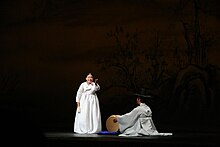| Heungbuga | |
 Heungbuga performed by Ahn Suk-seon for the World Library and Information Congress at COEX, Seoul, South Korea, 2006. | |
| Korean name | |
|---|---|
| Hangul | 흥부가 |
| Hanja | |
| Revised Romanization | Heungbuga |
| McCune–Reischauer | Hŭngbuga |
Heungbuga (Korean: 흥부가) is one of the five surviving stories of the Korean pansori storytelling tradition. It is also called Baktaryeong (박타령) or Hungboga (흥보가). The other stories are Simcheongga, Chunhyangga, Jeokbyeokga and Sugungga. It is about the story of Heungbu, a poor but good man with many children.[1] Heungbuga depicts common people's lives with a folksy atmosphere. Many listeners prefer Heungbuga because of its focus on humor. This humor in pansori is called jaedam sori, which means funny sound in Korean.
The most famous part of Heungbuga is "Cranky Nolbu," depicting the nasty Nolbu in a light-hearted fashion with a fast Jajinmori rhythm. It is widely considered that the latter part of Heungbuga is inferior to the beginning. One explanation for this is that the latter part was not sufficiently revised by its singers over the years. This could be used as evidence for the importance of deoneum in pansori.[2]
- ^ http://100.empas.com/dicsearch/pentry.html?s=K&i=239639&v=42 [dead link]
- ^ 재미있는 우리국악 이야기